Britons most likely to see Conservatives as having a ‘good campaign’
Latest Ipsos General Election Campaign tracker reveals that public increasingly expects a Conservative majority following next week’s election.
- 31% of Britons think the Conservatives are having a good campaign, compared to 23% for Labour, 17% for the Liberal Democrats and 16% for the Brexit Party.
- 48% think Labour are having a bad campaign – up 9 points in one week.
- 34% of Britons expect a Conservative majority after the election – up 7 points in a week. Overall 63% expect the Conservatives to at least be the largest party.
- 56% are not confident that the Conservatives have credible spending plans to improve Britain’s public services. 61% are not confident in Labour’s plans.
Who is having a good campaign?
- In a poll taken over the past weekend (Nov 29th to Dec 2nd), the Conservatives have seen a slight improvement in their figures for having a ‘good campaign’. 31% say the party is having a good campaign (up 4 points from last week) compared to 34% that say bad campaign (unchanged).
- In contrast, 23% think Labour are having a good campaign (down 5 points in a week) compared to 48% that say the party is having a bad campaign (up 9 points). Having steadily improved since the start of the campaign, Labour are back where they started with a net score of -25 now compared to -23 at the beginning of the campaign (and -11 last week).
- Meanwhile the Lib Dems have failed to recover after last week’s fall in scores. In fact, their scores on this measure have fallen further this week. Just 17% think the party is having a good campaign (down 2 points since last week) and 41% say the party is having a bad campaign (up two points). This means their net score has fallen a further 4 points this week and some 15 points since the beginning of the campaign (from -9 to -24).
- 16% think the Brexit Party are having a good campaign, 41% a bad campaign. Net -25 (down four points from last week).
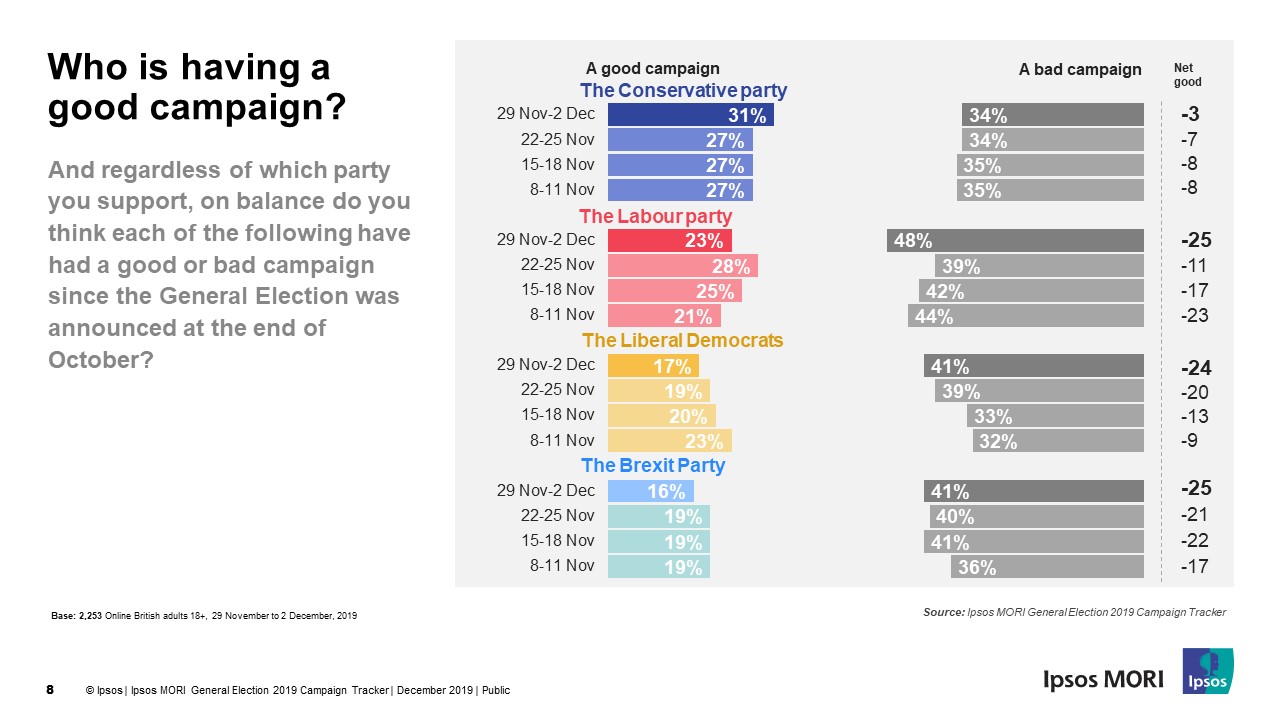
Favourability towards party leaders and parties
- The Prime Minister Boris Johnson continues to have better favourability scores than the other party leaders in our survey, despite having negative ratings overall.
- 33% are favourable towards Boris Johnson, 47% unfavourable. Net -14. These scores are unchanged from last week.
- Labour leader Jeremy Corbyn continues to command the worst favourability scores of the party leaders included in the survey. 60% are unfavourable towards the Labour leader (43% very unfavourable), with just 22% favourable. His net score of -38 is virtually the same as the score achieved at the beginning of the campaign (-39).
- Jo Swinson’s favourability figures have not recovered after falling sharply last week. Her net score of -31 is unchanged with 49% unfavourable towards the Lib Dem leader and 18% favourable.
- 22% are favourable towards Brexit Party leader Nigel Farage, 55% unfavourable, net -33.
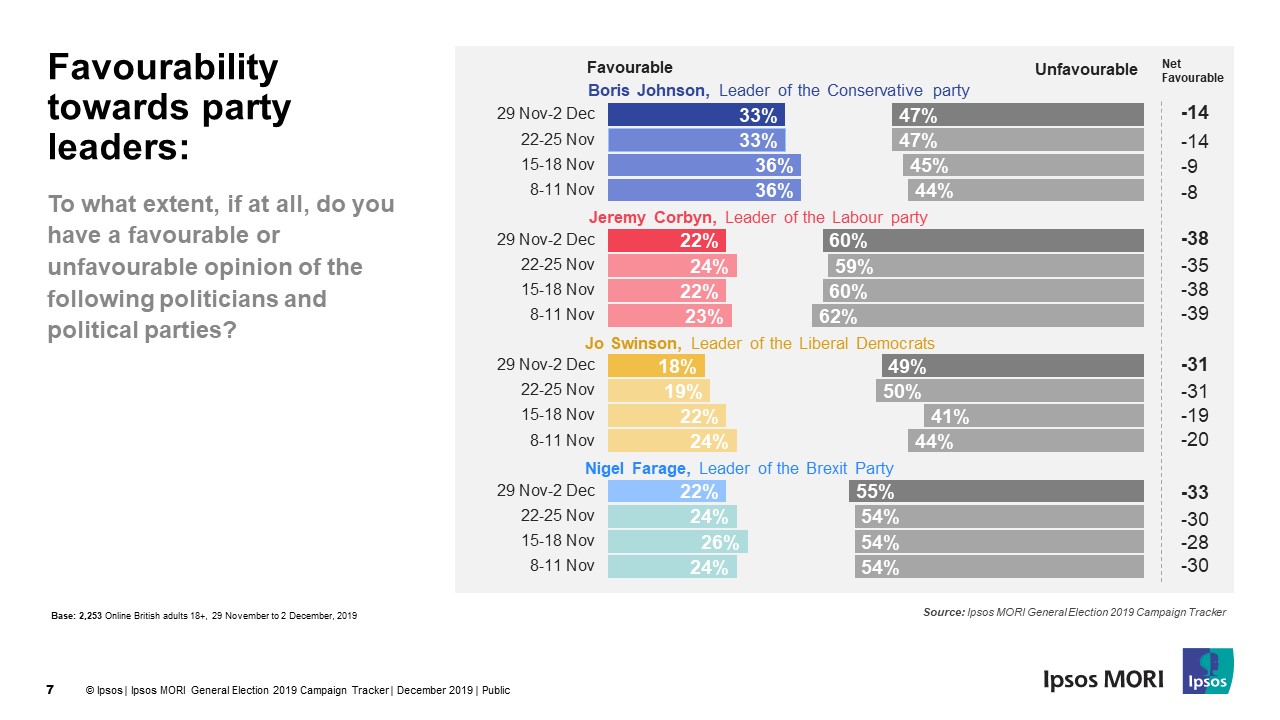
- Turning to the parties, 34% of Britons are favourable towards the Conservative Party, 45% unfavourable. Net -11. The party’s net score was -9 last week and -3 in week one.
- 29% are favourable towards the Labour Party, 51% unfavourable. Net -22. This net score is similar to that achieved in week two (-23) and three (-21) but an improvement on the -29 achieved in week one.
- In keeping with their leader’s numbers, the Lib Dems have not seen an improvement in favourability scores after a fall last week. 23% of Britons are favourable towards the party with 48% unfavourable. The party’s net favourability score of -25 is virtually the same as last week (-26) but significantly below that achieved in week’s one (-19) and two (-17).
- Leave voters are most favourable towards the Conservatives (54% favourable), compared to 40% for the Brexit Party, 14% for Labour and 9% for the Liberal Democrats.
- Remain voters are most favourable towards the Labour party (45%) then the Liberal Democrats (40%). Remainers were more favourable towards the Lib Dems in week one but Labour moved into first place in week two and have stayed there in week three and four. Both have a significant lead over the Conservatives (18%) and Brexit Party (5%) among this group.
Issues deciding your vote
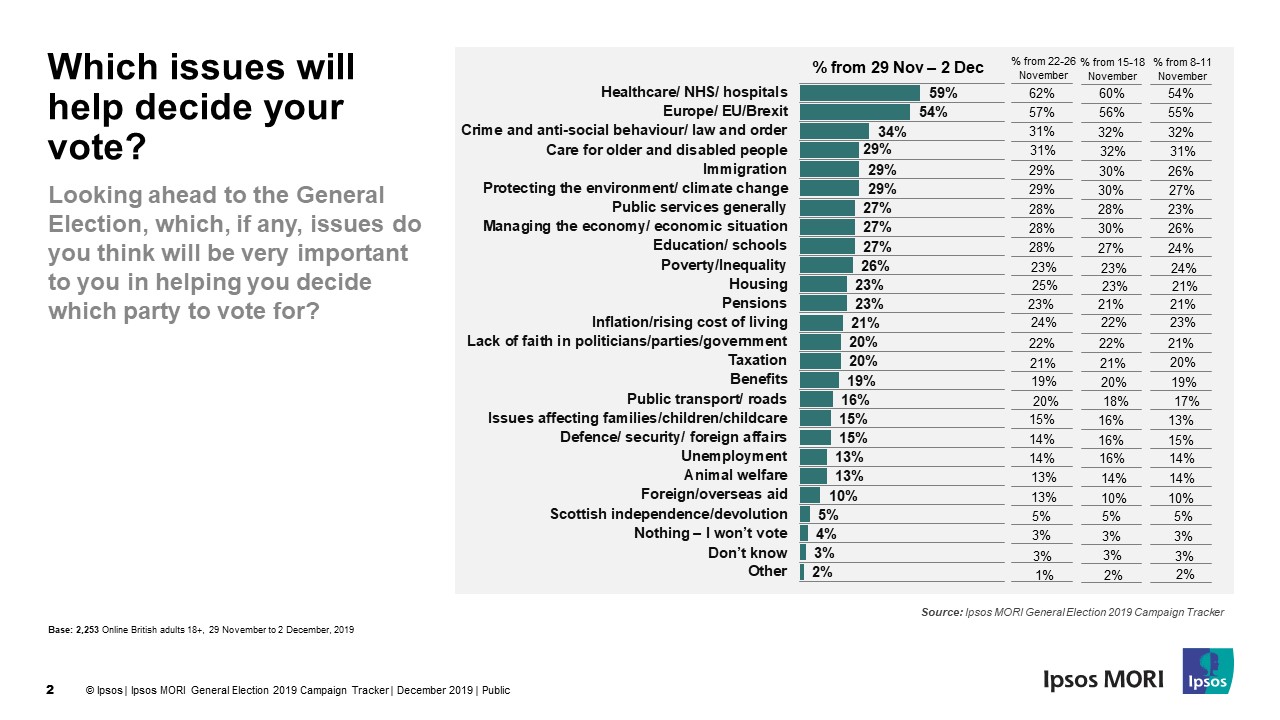
- When prompted with a list of issues that might be important to them in deciding how to vote in the upcoming election, the top two issues for Britons are the NHS (59%) and Brexit (54%). These figures are closely aligned with those seen in previous weeks. The NHS replaced Brexit as the number one issue for voters in this tracking study after week one.
- Crime / law and order (34%) is now a clear third this week after a 3-point increase in those saying it is a very important issue in influencing their vote.
- For 2017 Conservative voters, the top four issues are Brexit (68%), the NHS (54%), immigration (41%) and crime (40%).
- For 2017 Labour voters, the NHS is still the number one issue (71%), followed by Brexit (48%) followed by several other issues seen as important by two in five respondents.
- For leave voters, the top three issues impacting their vote are Brexit (64%), the NHS (59%), immigration (46%) and crime (40%). For Remain voters the key issues are the NHS (68%), Brexit (56%) and climate change (40%).
- When asked which party has the best policies on the issues that matter most to them, 27% of Britons overall said the Conservatives (up two points since last week), while 22% said Labour (down 1 pt). One in ten (9%) said the Liberal Democrats, 6% said the Brexit Party, 3% said the Greens and 2% said the SNP. Meanwhile, 11% said different parties were better on different policies, 10% said ‘none of these’ and 9% said that they didn’t know.
- Remain voters were most likely to say the Labour Party (36%) had the best policies on the issues they cared about, with fewer than one in five (17%) saying the Liberal Democrats. Leave voters were most likely to say the Conservatives (46%) had the best policies on the issues that mattered to them.
What will the election outcome be?
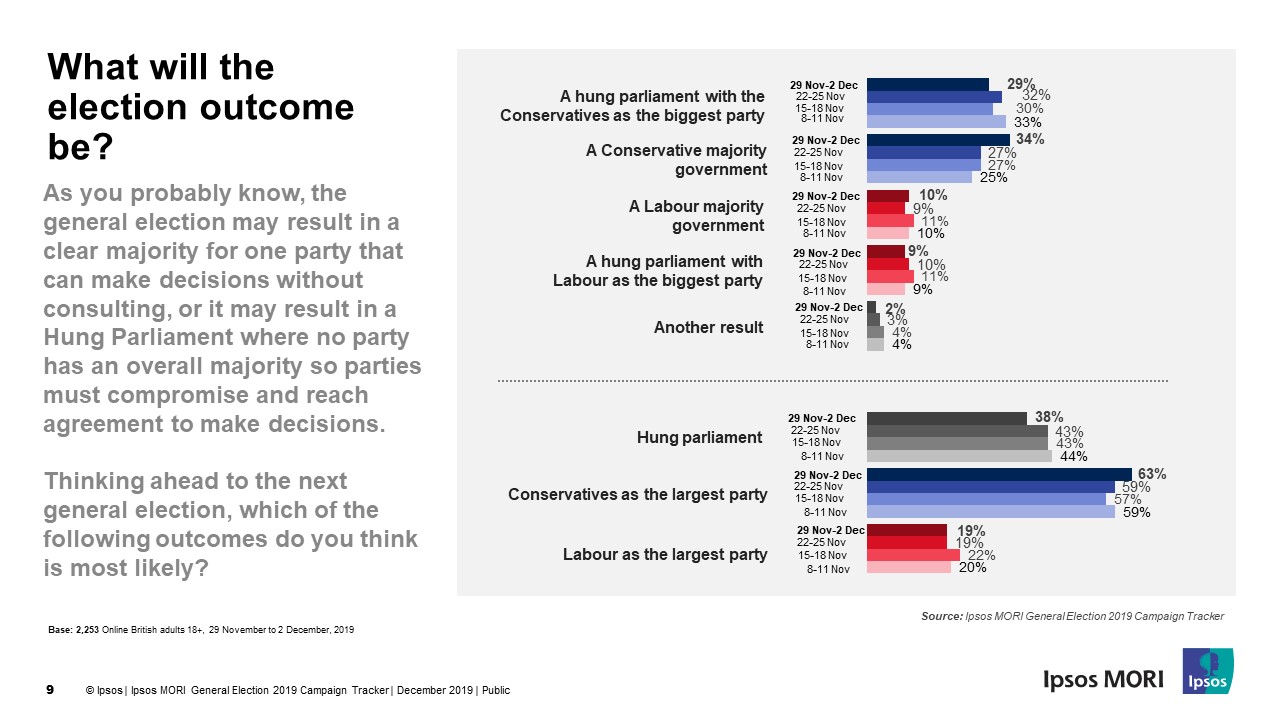
- After a stable picture in weeks one to three some notable changes are observed in the public’s predicted outcome of the election.
- 34% now expect a Conservative majority (up 7 points on last week) and a further 29% expect the Conservatives to be the largest party in a hung parliament (down 3 points). Overall, 63% at least expect the Conservatives to be the largest party after the election – a picture that has been consistently shown since week one.
- Half of (50%) 2017 Labour voters expect the Conservatives to be the largest party and more than four in five (84%) 2017 Conservative voters think the same.
- In contrast, one in five British adults (19%) expect Labour to be the largest party with 10% predicting a majority Labour government and 9% a hung parliament with Labour as the largest party. Around two in five (38%) 2017 Labour voters expect them to be the largest party after the election.
Public services
- There is little confidence amongst the British public in the ability for the three main parties to improve public services or come up with credible plans to pay for improvements.
- 34% are confident the Conservatives will improve Britain’s public services if they are in government after the election next week, 56% are not confident. Similarly 34% are confident the Conservatives have credible plans to pay for improvements whereas 56% are not.
- 35% are confident Labour will improve Britain’s public services if they are in government after next week’s election, 56% are not. 30% are confident Labour have credible plans to pay for improvements to public services 61% are not. Labour’s net score of -31 here is lower than the Conservatives score of -22.
- Meanwhile, 28% are confident the Lib Dems would improve Britain’s public services in government, 61% are not and 24% are confident the Lib Dems have credible plans to pay for such improvements and 63% are not.
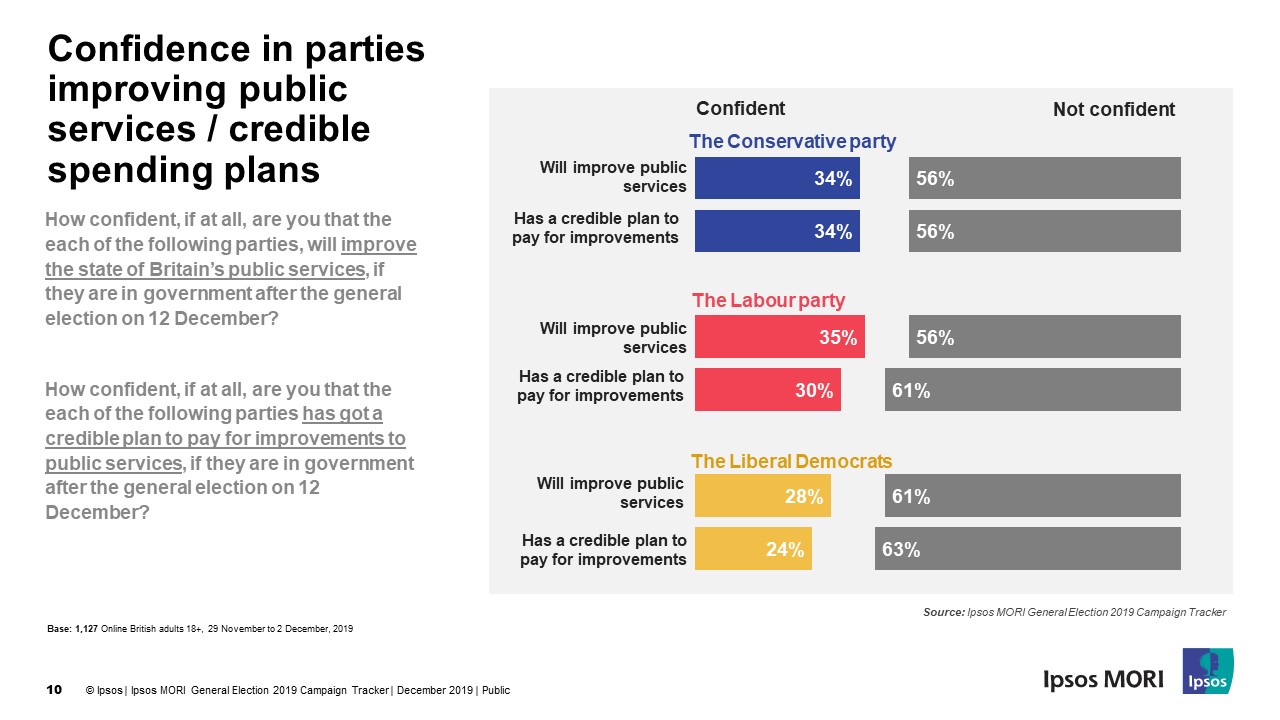
Equality of opportunity
- 33% of Britons are confident the Conservatives will increase equality of opportunity in government if they win next week, 56% are not.
- 34% are confident Labour will increase equality of opportunity in government if they win next week, 55% are not.
- 28% are confident the Lib Dems would increase equality of opportunity in government, 58% are not.
Commenting on the findings, Ipsos Research Director Keiran Pedley said:
With just over a week to go until polling day, the key indicators in our campaign tracker look positive for the Conservatives. The British public are most likely to see the Conservative Party as having a good campaign, more favourable towards Boris Johnson than other party leaders and they are now more likely to predict a Conservative majority ahead of other election outcomes. However, as the saying goes, a week is a long time in politics, and it remains to be seen whether or not the Conservatives can convert the positive figures for the party in this poll into a majority next week.
Technical note
Ipsos interviewed a representative sample of 2,253 British adults. Interviews were conducted online: 29th November to 2nd December. Data are weighted to match the profile of the population. All polls are subject to a wide range of potential sources of error.





